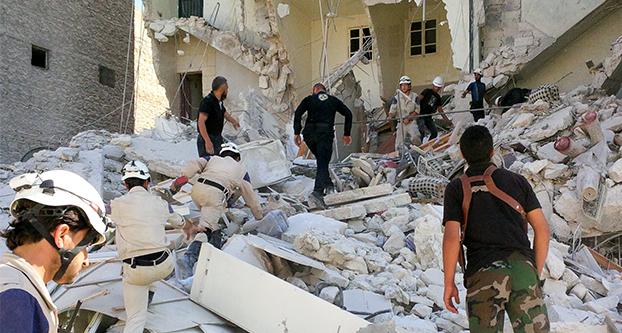Hagop Ohanessian is grateful for the life he lives in the U.S.
As a Fresno State Armenian Studies professor, he cherishes the chance to go to work every day and make a difference in the lives of his students.
Every day when he enters the classroom, Ohanessian strives to encourage his students and to instill a passion for learning.
While he lives his dream in the U.S., however, Ohanessian also has nightmares about his family on the other side of the world.
In Syria, his uncle and cousins have woken up many times to the sound of bombings. They have spent many days in the war-torn country without electricity, water and peace of mind.
Their only choice was to flee to nearby Lebanon, where they have now stayed as refugees for almost four years.
“As a result of the war, a lot of families have left Syria,” Ohanessian said. “You can imagine the bombings they hear”” how that affects them psychologically”” being around that every day. This is not something that happens once in a week or so. It’s constant. They’re around it all the time.”
The conflict in Syria began in the spring of 2011 with anti-government demonstrations.
Then, the peaceful protests escalated after the government’s violent crackdown, and rebels began fighting back against the regime.
Ohanessian is one of many Armenians from Syria, but he was only 2 years old when he left the country.
Most of what he knows about Syria comes from his parents and relatives, who lived there most of their life.
They tell him about the Syria they knew growing up.
“They were very happy there,” Ohanessian said. “It was calm. They didn’t have problems with the government.”
Today, almost everyone in Syria is affected by the war, including the thousands of Armenians in the country.
“Over 100,000 Armenians lived in Syria, where I was born,” Ohanessian said. “A lot of other minority groups have also been impacted”” Christians, Arabs, Greeks have been targeted.”
Every day when he turns on the news, Ohanessian sees gruesome images from the conflict.
Still, the life he sees in the news is not a life he can imagine.
“Those individuals that are living there, they know what they’re going through,” Ohanessian said. “We can’t imagine what’s going on over there, because we have food; we have water; we have a place to stay. These people wake up every day not knowing if they’re gonna be alive that day”” what’s gonna happen; how they’re gonna put food on the table; how are they gonna take a shower?”
As an Armenian studies professor, Ohanessian connects the events of Syria with the history of Armenia.
He relates the Syrian conflict with the Armenian Genocide while also discussing how the war affects Armenians in Syria.
From the 100,000 Armenians who once lived in Syria, only about 5,000 still live there, Ohanessian said.
“Imagine how difficult it is for the people that lived there and those that have families that lived there to see their churches destroyed, to see their schools targeted, to see their cultural institutions destroyed,” he said. “Some have found refuge in the Republic of Armenia. Some are going to Europe. Some are coming to the U.S. or Canada.”
Ohanessian’s uncle is expected to leave Lebanon and go to Canada next year.
In a way, Ohanessian is happy for his uncle, but he’s also cautiously optimistic about the life of a refugee.
“I know the United States has accepted a lot of refugees. Europe has accepted a lot of refugees. And it’s difficult because how are you going to handle all those people?” Ohanessian said. “You have to figure out a way to implement policies, immigration rules. You have to give these people an opportunity to find a job, secure a place for them to live.”
Ohanessian takes solace in hearing recent discussions about bringing change to Syria.
“I feel that there has been more open dialogue now,” he said. “A lot of countries such as the United States and Russia and some countries in Europe are wanting to bring peace to this area.”
But the discussions could still go on for some time.
“When you’re in a negotiating process to bring a war to an end, someone has to give something up or it’s has to benefit one side or the other,” Ohanessian said. “But you want to ultimately come to a compromise as well, so hopefully there’s better dialogue between Syria and the rest of the world.”
Although Ohanessian hopes for better days in Syria, his optimism doesn’t come easy.
“I want to be optimistic, but with the situation like this, you don’t know,” he said. “You have to think about the destruction that has been taking place. You gotta bring all that back, but it’s difficult.”
While his uncle prepares to depart Lebanon for Canada, many of Ohanessian’s relatives are still in Syria, hoping to find refuge.
“My mom still has cousins there,” Ohanessian said. “They’re going to try to find refuge somewhere else; maybe go to Lebanon; find someplace; someway.”
But there are too many hurdles for anyone who tries to flee from Syria to nearby countries.
“You’re not guaranteed to get to that destination because a lot of war activity is going on,” Ohanessian said. “They’ll stop you and say, ‘Who are you? What are you?’ You may be killed right there.”




